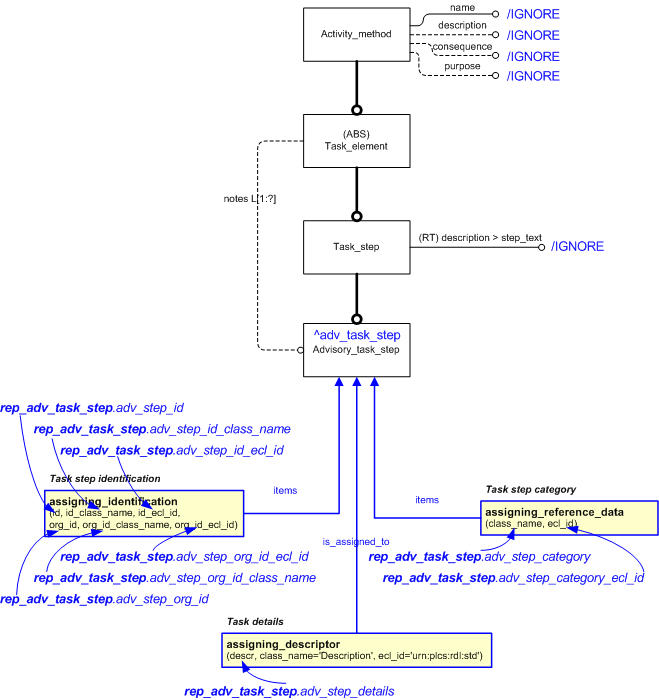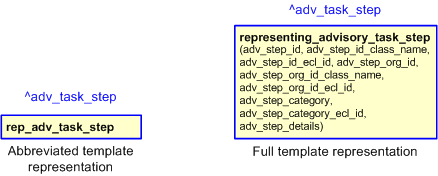| Template:— representing_advisory_task_step (rep_adv_task_step) |
Date: 2010/03/25 15:15:28
Revision: 1.8
|
This section specifies the template representing_advisory_task_step.
NOTE
An explanation of a template and the associated instantiation path is
provided in the
Template overview
section.
This template describes how to represent an advisory task step,
Advisory_task_step,
such as a warning, caution, or note.
The EXPRESS-G diagram in
Figure
1
shows the templates and EXPRESS entities that are required
to represent the template
"representing_advisory_task_step".
The text highlighted in blue shows the template parameters.
Figure 1 — An EXPRESS-G representation of the Information model for representing_advisory_task_step
The graphic for the template to be used in other EXPRESS-G diagrams
is shown in Figure
2
below.
Figure 2 — The graphical representation of the representing_advisory_task_step template
The following input parameters are defined for this template:
The identifier of the advisory task step, e.g. the task step number.
The name of the class being used to classify the advisory task step identifier (i.e. the @adv_step_id)
The following classes and their sub-classes can be used:
The identifier of the
External_class_library
storing the definition of the class referenced by the parameter @adv_step_id_class_name.
The name or identifier of the
Organization that owns the @adv_step_id.
The name of the class being used to classify the identification of the
Organization responsible for creating the @adv_step_id.
The following classes and their sub-classes can be used:
The identifier of the
External_class_library storing the
definition of the class referenced by the parameter @adv_step_org_id_class_name.
The name of the
External_class
being used to categorize the advisory task step.
The following classes and their sub-classes can be used:
The actual content of the advisory task step, e.g. the warning text.
The following reference parameters are defined for this template:
Allow the
Advisory_task_step
entity instantiated in this path to be referenced when this template is used.
%^target = $representing_advisory_task_step.adv_task_step%
The following parameter combinations specify a uniqueness constraint:
Unique constraint: Advisory task step
The instantiation path shown below specifies the entities that are to be
instantiated by the template.
A description of templates and the syntax for the instantiation path is
provided in the
Templates Help/Information section.
Advisory_task_step%^adv_task_step =
Advisory_task_step%
Advisory_task_step.name = '/IGNORE'
Advisory_task_step.description = '/IGNORE'
Advisory_task_step.consequence = '/IGNORE'
Advisory_task_step.purpose = '/IGNORE'
-- Identify the Advisory_task_step /
assigning_identification(
items= ^adv_task_step,
id= @adv_step_id,
id_class_name= @adv_step_id_class_name,
id_ecl_id= @adv_step_id_ecl_id,
org_id= @adv_step_org_id,
org_id_class_name= @adv_step_org_id_class_name,
org_id_ecl_id= @adv_step_org_id_ecl_id )/
/
assigning_descriptor(
descr= @adv_step_details,
class_name= 'Description',
ecl_id= 'urn:plcs:rdl:std',
is_assigned_to= ^adv_task_step)/
/
assigning_reference_data(
items=^adv_task_step,
class_name=@adv_step_category,
ecl_id=@adv_step_category_ecl_id)/
The following entities are instantiated with attributes as specified:
The instance diagram in Figure
3
shows an example of the EXPRESS entities and templates that are instantiated by the template:
/representing_advisory_task_step(adv_step_id='50', adv_step_id_class_name='Task_step_identification_code', adv_step_id_ecl_id='urn:plcs:rdl:std', adv_step_org_id='The Bike Company Ltd', adv_step_org_id_class_name='Organization_name', adv_step_org_id_ecl_id='urn:plcs:rdl:std', adv_step_category='Caution', adv_step_category_ecl_id='urn:plcs:rdl:sample', adv_step_details='Always keep both hands on handrail when utilizing product for personnel transport.')/
(an illustration of the consolidated representing_advisory_task_step template is shown in
Figure
4 below.)
Figure 3 — Entities instantiated by representing_advisory_task_step template
The instance model in STEP ASCII exchange file format (ISO 10303 Part
21 syntax) is:
#15 = CLASSIFICATION_ASSIGNMENT(#16,(#13),'/IGNORE');
#13 = IDENTIFICATION_ASSIGNMENT('The Bike Company Ltd','/IGNORE','/IGNORE',(#11));
#11 = ORGANIZATION('/IGNORE','/IGNORE');
#7 = EXTERNAL_CLASS('/NULL','Task_step_identification_code','/IGNORE',#17);
#6 = CLASSIFICATION_ASSIGNMENT(#7,(#4),'/IGNORE');
#4 = IDENTIFICATION_ASSIGNMENT('50','/IGNORE','/IGNORE',(#2));
#2 = ADVISORY_TASK_STEP('/IGNORE','/IGNORE','/IGNORE','/IGNORE',$);
#31 = CLASSIFICATION_ASSIGNMENT(#32,(#29),'/IGNORE');
#29 = DOCUMENT('/IGNORE','/IGNORE','Always keep both hands on handrail when utilizing product for personnel transport.');
#28 = EXTERNAL_CLASS_LIBRARY('urn:plcs:rdl:std','/IGNORE');
#27 = EXTERNAL_CLASS('/NULL','Description','/IGNORE',#28);
#26 = CLASSIFICATION_ASSIGNMENT(#27,(#24),'/IGNORE');
#24 = DOCUMENT_ASSIGNMENT(#29,#2,'/IGNORE');
#21 = EXTERNAL_CLASS('/NULL','Owner_of','/IGNORE',#17);
#20 = CLASSIFICATION_ASSIGNMENT(#21,(#18),'/IGNORE');
#18 = ORGANIZATION_OR_PERSON_IN_ORGANIZATION_ASSIGNMENT(#11,'/IGNORE',(#4));
#17 = EXTERNAL_CLASS_LIBRARY('urn:plcs:rdl:std','/IGNORE');
#16 = EXTERNAL_CLASS('/NULL','Organization_name','/IGNORE',#17);
#37 = EXTERNAL_CLASS_LIBRARY('urn:plcs:rdl:sample','/IGNORE');
#36 = EXTERNAL_CLASS('/NULL','Caution','/IGNORE',#37);
#35 = CLASSIFICATION_ASSIGNMENT(#36,(#2),'/IGNORE');
#32 = EXTERNAL_CLASS('/NULL','Descriptor','/IGNORE',#17);
The instance model in STEP XML exchange file format (ISO 10303 Part
28 ed.2 syntax) is:
The instance diagram in
Figure
4
shows the graphic symbol for the template that is to be
used in other instance diagrams. The example template is:
/representing_advisory_task_step(adv_step_id='50', adv_step_id_class_name='Task_step_identification_code', adv_step_id_ecl_id='urn:plcs:rdl:std', adv_step_org_id='The Bike Company Ltd', adv_step_org_id_class_name='Organization_name', adv_step_org_id_ecl_id='urn:plcs:rdl:std', adv_step_category='Caution', adv_step_category_ecl_id='urn:plcs:rdl:sample', adv_step_details='Always keep both hands on handrail when utilizing product for personnel transport.')/
Figure 4 — Instantiation of representing_advisory_task_step template
Characterizations
No common characterizations of the template
representing_advisory_task_step
have been identified. However, the ISO 10303-239 EXPRESS model
may enable other assignments to the entities instantiated by the template.




